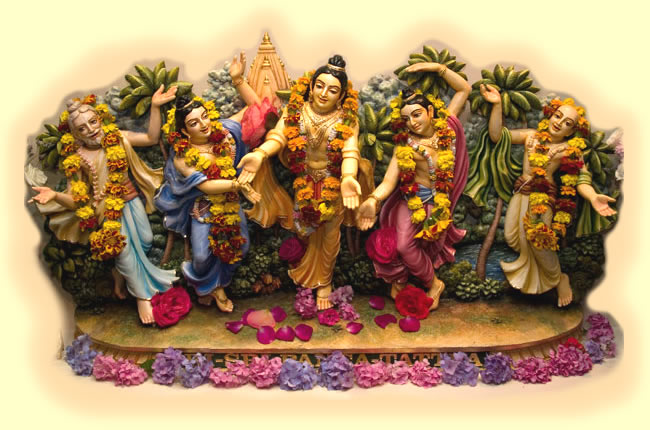(1-2)
The
Supreme Lord said: 'Mysticism nor analysis, common piety nor
the study of the scriptures; penances, renunciation, desirable
and pious works nor charity; respecting vows, ceremonies, vedic
hymns, pilgrimage, general discipline nor the basic rules
contain Me the way the sat-sanga [see
11.11:
25] contains Me
that removes all attachment to sense gratification.
(3-6)
By means of sat-sanga only many living entities, like
the sons of Diti, the malicious ones, the animals, the birds,
the singers and dancers of heaven, the excellent and perfected,
the venerable and the treasure keepers, the scientific ones
among the humans and the merchants, laborers and women, the
uncivilized and the ones of passion and slowness, in each and
every age achieve My abode. And so did Vritrâsura,
the son of Kayâdhû [Prahlâda,
see 6.18:
12-13] and others
like them, Vrishaparvâ [see 9.18:
26],
Bali,
Bâna,
Maya
as also Vibhîshana [brother of Râvana],
Sugrîva [leader of the Vânaras]
and Hanumân,
Jâmbavân,
Gajendra,
Jatâyu,
Tulâdhâra,
Dharma-vyâdha,
Kubjâ
and the gopîs in Vraja, as also the wives of the
brahmins [see 10.23]
and others. (7)
They, not having studied the sacred scriptures, nor having
worshiped the great saints, attained, without vows and not
having undergone austerities, Me through My association.
(8-9)
Indeed through love only the gopîs, the cows, the
immobile creatures, the animals, the snakes [like
Kâliya]
and others who were stunted in their intelligence, achieved
perfection quite easily because they came to Me, I who cannot
even be reached by greatly endeavoring with yoga, analysis,
charity, vows, penances, ritualistic sacrifices, exegesis,
personal study or taking to the renounced order.
(10)
When Akrûra took Me and Balarâma to Mathurâ
were the inhabitants constantly attached [to Me] with
minds steeped in the deepest love. With Me as the only one to
make them happy were they most miserable after being separated
from Me [see 10:
39].
(11)
All the nights they spent in Vrindâvana with Me, their
most dearly Beloved, o Uddhava, seemed to take but half a
moment to them, but again bereft of Me they appeared to take as
long as a kalpa.
(12)
They with their consciousness bound to Me in intimacy had lost
the awareness of their own bodies, just as sages who fully
absorbed lose the awareness of matters as close as names and
forms, when they like rivers entering the ocean moved far
[in the beyond, see also B.G. 2:
70].
(13)
The women with Me, a charming lover to their desire, a lover of
another man's wife, had no idea of the actual position of Me,
the Absolute Truth Supreme, whom they by the hundreds of
thousands achieved in association. (14-15)
Therefore o Uddhava give up the injunctions, the regulations
about them and the ritual culture for its own sake, give up
that what you learned and will be learning; go for Me alone,
the actual shelter of the soul within all the ones embodied;
with that exclusive devotion you should by My mercy have
nothing to fear from any side [compare B.G.
18:
66].'

(17) The Supreme Lord said: 'He, the living being in person, is manifest within along with the prâna, for He entered the heart having His place in the subtle sound vibration that fills the mind in the grosser form of the different intonations of short and long vowels and consonants. (18) Just as fire confined within wood, with the help of air, kindled by friction is born very tiny and increases with ghee, I similarly manifest Myself in this spoken [vedic] word. (19) Thus there are as [My] transformations speech, the function of the hands and legs, the genitals and the anus [the karmendriyas]; smell, taste, sight, touch and hearing [the jñânendriyas] and the functions of one's determination, wisdom and self concern [or 'mind, intelligence and false ego'] as well as the primary of matter [pradhâna or the thread, see 11.9: 19] and rajas, tamas and sattva [the gunas]. (20) Indeed this living entity, one and unmanifest, that is concerned with the threefold, is the source of the lotus of creation. He, eternal as He is, in the course of time dividing His potencies in many divisions, appears just like seeds do having fallen in a fertile field. (21) Just as cloth expands along the warp and woof of its threads, is the whole of this Universe, expanding long and wide, situated in Him [on His thread, see also 6.3: 12 and B.G. 7: 7]. Of this material existence is there since time immemorial this tree [this organic body] which, blossoming producing the fruits, is naturally inclined to fruitive action [or karma]. (22-23) Of this tree extending in the sun there are two seeds [sin and piety], hundreds of roots [the living entities], three lower trunks [the modes], five upper trunks [the elements], five saps produced [sound, form, touch, taste and aroma], eleven branches [the mind and the ten indriyas]; two birds having a nest [jîva and âtmâ], three types of bark [air, bile and mucus] and two fruits [happiness and distress]. The lusty one living in a household enjoys one fruit of the tree, whereas the other swanlike ones who live in the forest with the help of the worshipable ones [the devotees, the gurus] know the Oneness of Him who by dint of His mâyâ appears in many forms. (24) Thus being of an unalloyed devotional service that developed worshiping the guru, should the sober one by means of the sharp axe of knowledge cut down the individual soul its subtle body of attachment, so that he with the greatest care living spiritually achieves the Supreme Soul. Thereafter he should relinquish the means by which he attained.'

